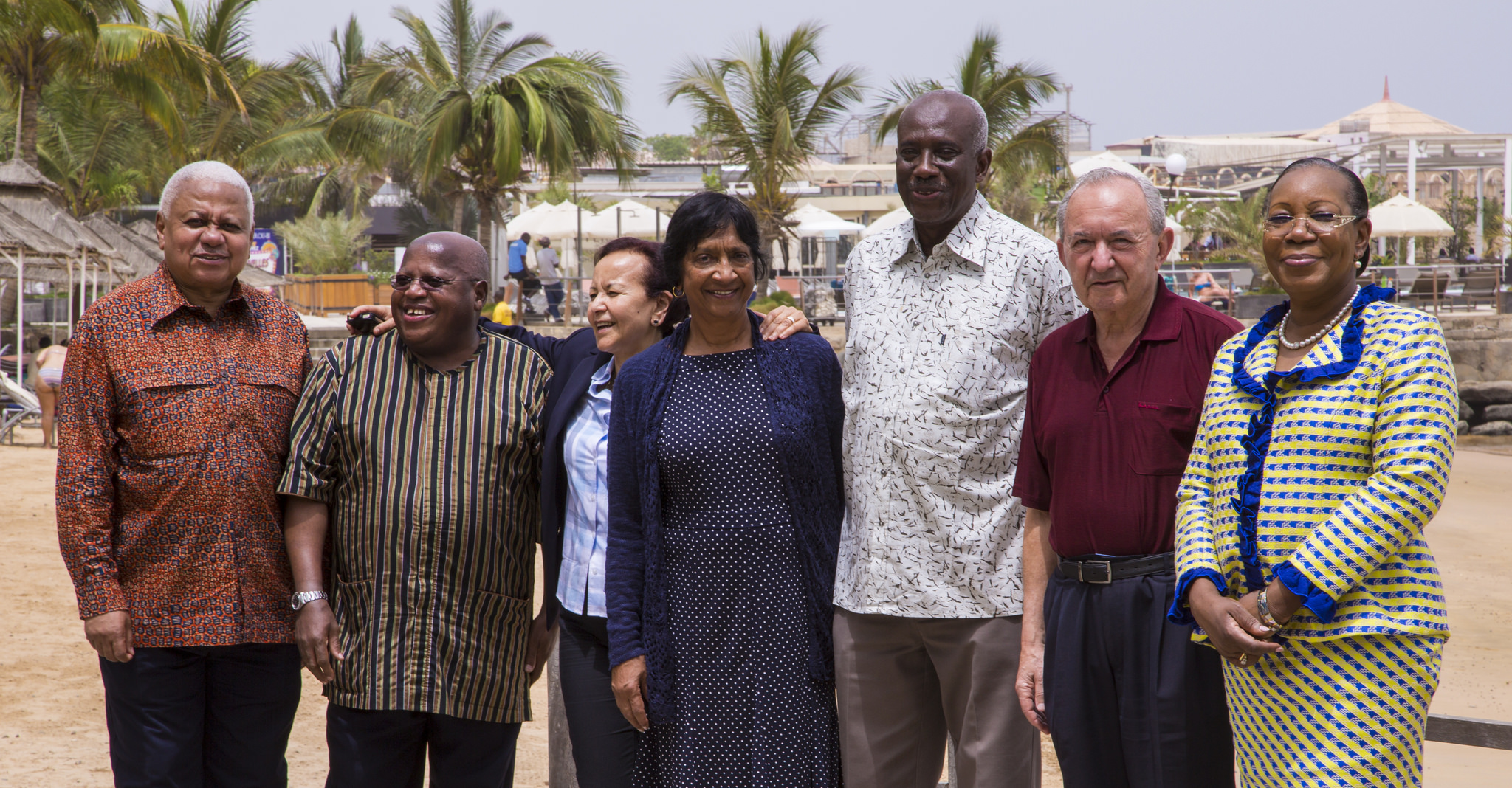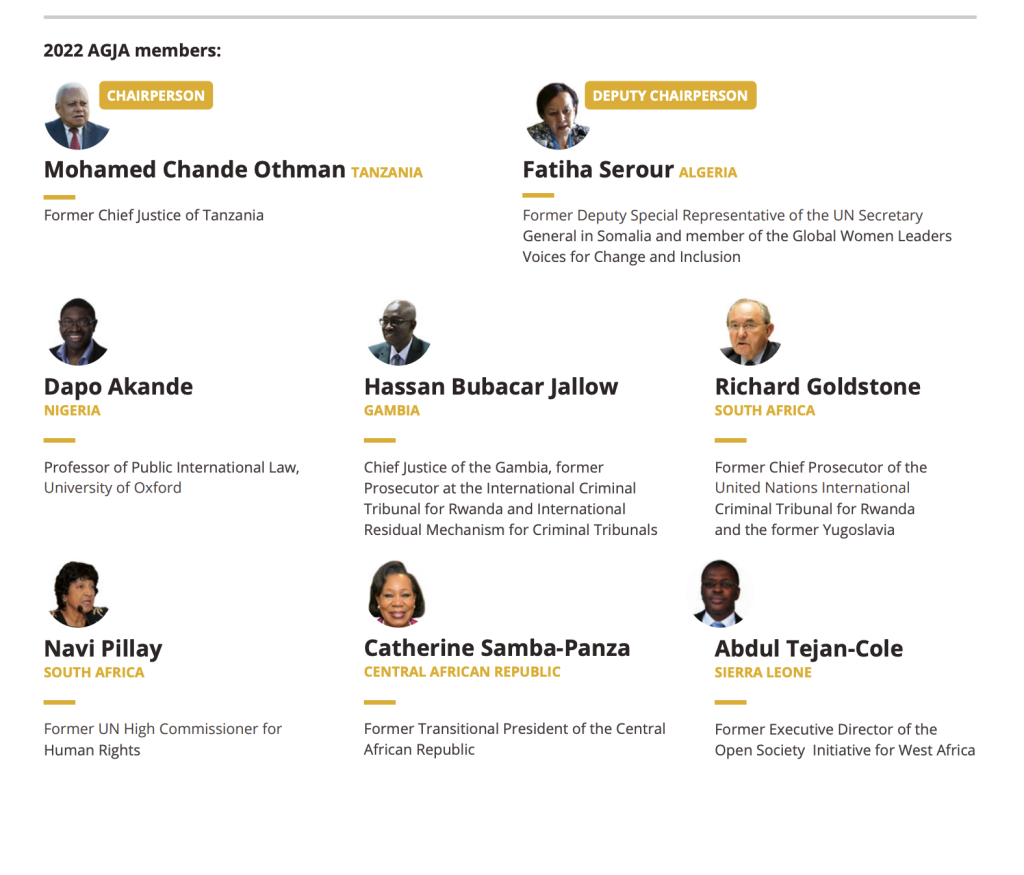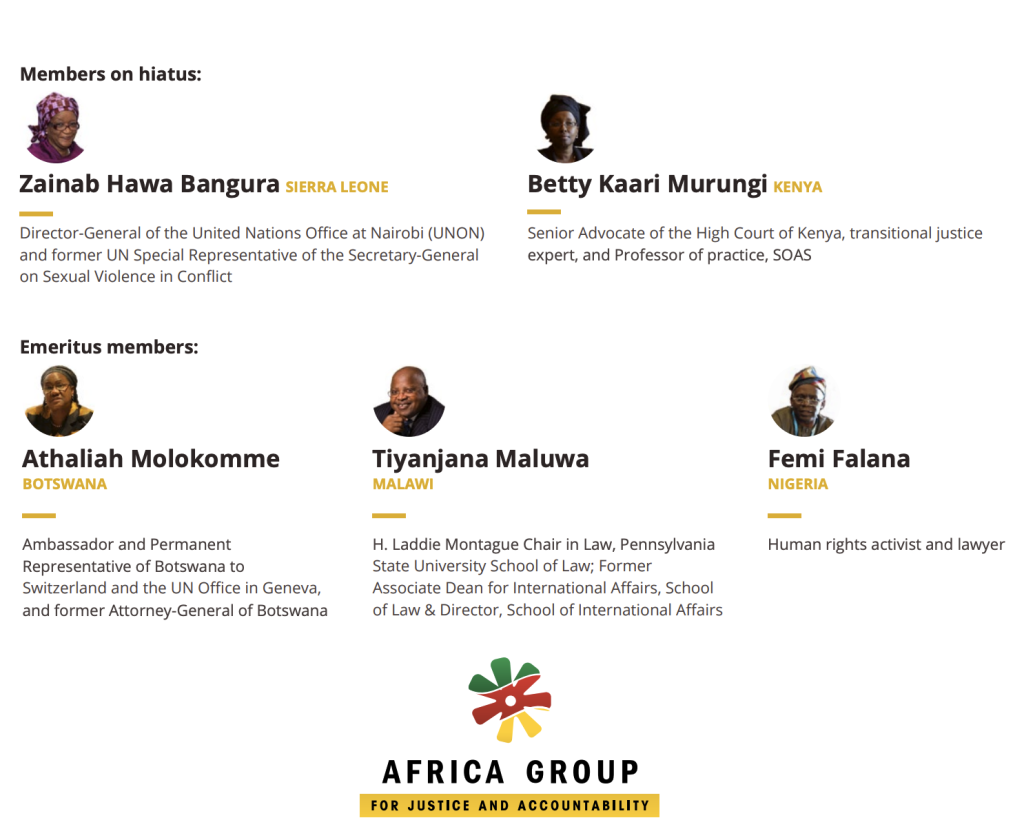The Africa Group is an independent group of senior African experts on international criminal law and human rights, including political figures, members of international and domestic tribunals, and human rights advocates that came together in November 2015 to strengthen justice and accountability in Africa.
MISSION STATEMENT
The Africa Group for Justice and Accountability supports efforts to strengthen justice and accountability measures in Africa through domestic and regional capacity building, advice and outreach, and enhancing cooperation between Africa and the International Criminal Court.
HISTORY
African nations and communities have been important players in the global struggle for the rule of law and the fight against impunity for international and transnational organised crimes. For decades, African states, diplomats, and community leaders have played critical roles in the development of international criminal justice. In recent years, however, the relationship between African states, the African Union and the international tribunals like the International Criminal Court (ICC) have become strained, the result of conflicting perceptions about the Court’s role and broader justice and accountability measures in Africa. To date, however, there has been no systematic effort to identify and develop means to overcome such challenges or to engage with the diverse concerns of African states.
The Africa Group came together in November 2015 to advance justice and accountability measures in Africa and focus on contentious issues such as the current ICC-Africa relationship. The Africa Group also aims to strengthen local accountability measures, such as domestic crime units for international crimes, hybrid courts, and regional justice initiatives.
One of the Africa Group’s unique features is its independence from governments, the ICC, and other organisations. This has been indispensable to the Group’s mandate.
The Africa Group meets on a regular basis across the continent and engages politicians, members of the judiciary, the media, students, and interested citizens.
The Wayamo Foundation is the group’s secretariat and convener.
KILIMANJARO PRINCIPLES
The Kilimanjaro Principles on International Justice and Accountability were first agreed to at the AGJA’s strategic meeting in Arusha, Tanzania on 17 October 2016.
The Africa Group for Justice and Accountability will:
- Champion Justice and Accountability
Promote efforts to ensure justice and accountability for perpetrators of international crimes. - Enhance Complementarity by Building Capacity
Enhance complementarity by providing expertise, promoting the establishment and strengthening of effective domestic and regional justice mechanisms. - Support the International Criminal Court and Universal Ratification of the Rome Statute
Encourage a positive and cooperative relationship between African states and the International Criminal Court as well as advocate universal ratification of the Rome Statute. - Promote Facilitation, Mediation and International Cooperation
Support international cooperation and offer independent expert advice, facilitation and mediation to African states, the African Union, the International Criminal Court, and the international community. - Foster Transparency and Open Dialogue
Foster open, transparent dialogue on the role and impact of international justice in Africa, provide open forums where African states, citizens and organisations can discuss African and global perspectives on justice and accountability.
ACHIEVEMENTS
AGJA has:
- consolidated its role as a credible player that fosters and enables dialogue among diverse justice- related sectors;
- established itself as a new, African-led voice to promote international justice in Africa;
- grown significantly in terms of popular recognition, being cited in local, regional and international news items, and has been consistently raising its social media profile;
- emerged as a key interlocutor for like-minded groups and civil society organisations working in the field of human rights and international justice resulting in important players (the ICC, African Union, civil society organisations) expecting AGJA to play a facilitating, mediating and diplomatic role;
- contributed to a changed narrative regarding justice and accountability on the African continent. Following the withdrawal announcements of Burundi, The Gambia and South Africa, AGJA members engaged in backdoor diplomacy and approached the respective Foreign and Justice Ministers to convince them to publish public statements of support for the ICC;
- engaged with AU officials and diplomats in multiple meetings. The AU has opened its doors to AGJA by receiving a delegation in Addis Ababa;
- held side events at the Assembly of States Parties of the ICC hosted by several African states;
- provided advice for The Gambia’s Truth, Reconciliation and Reparations Commission and completed its first mission, including consultations with key actors, at the invitation of the Minister of Justice;
- contributed to a series of behind-the-scenes meetings on contentious issues;
- actively engaged in capacity-building workshops for investigators and prosecutors in West and East Africa;
- contributed to the vanguard of international criminal justice; recent highlights include the appointment of Navi Pillay as an ad hoc judge at the International Court of Justice, Betty Murungi’s appointment to the UN Commission of Inquiry on the 2018 protests in the Occupied Palestinian Territory and the selection of Richard Goldstone, Hassan Bubacar Jallow and Mohamed Chande Othman as members of the “Independent Expert Review of the ICC”.




